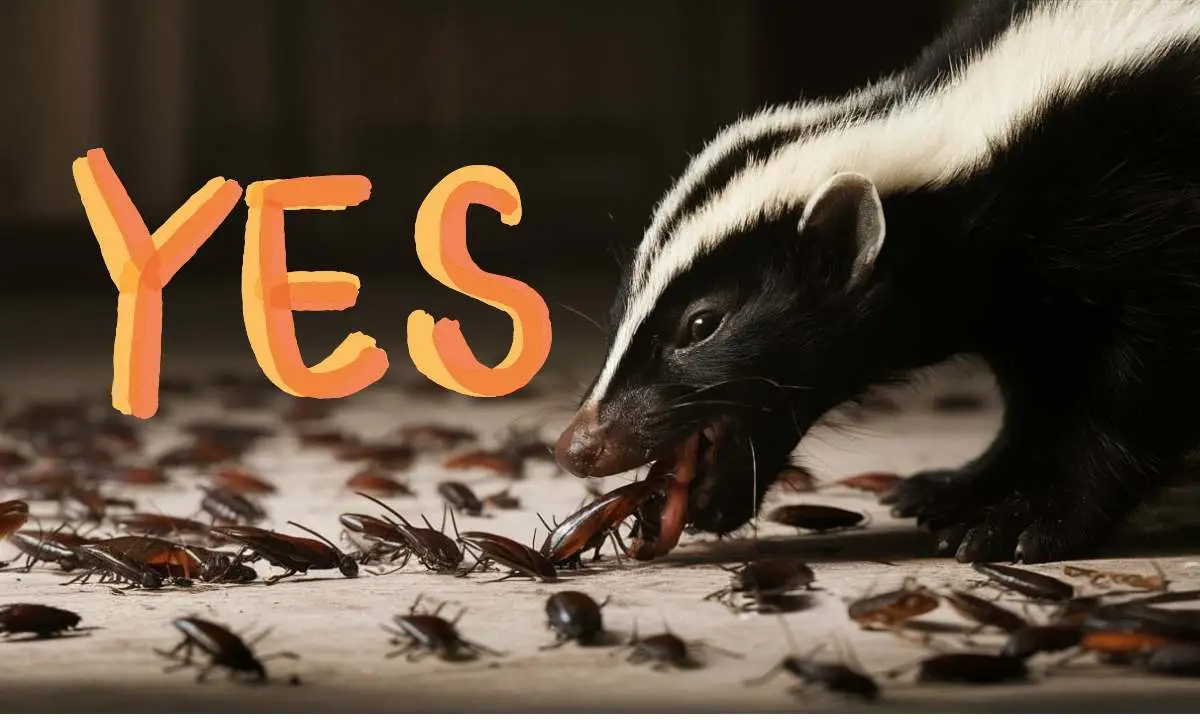Do Skunks Eat Roaches?
Last updated on August 11th, 2024 at 07:31 am
Yes, skunks do eat roaches! From my time caring for skunks and observing wildlife, I’ve learned that these animals are more than their famous smell. Skunks love to eat insects like cockroaches, which makes them great natural pest controllers. Want to know how these nocturnal foragers help keep the roach population down? Stick around and explore the fascinating ways skunks contribute to the environment
Roaches In The Skunk Diet
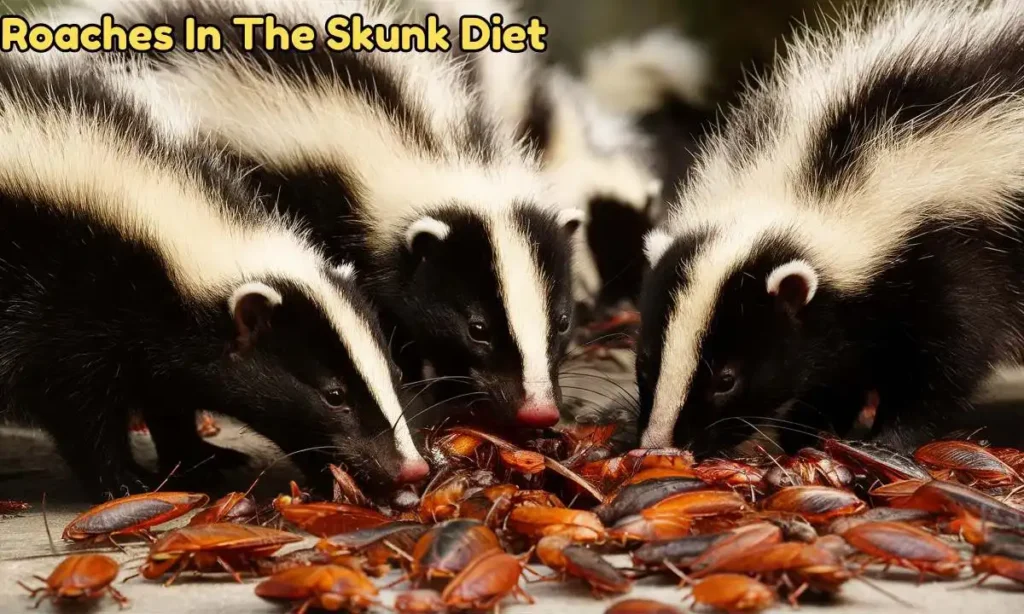
Skunks are known for their black and white stripes and their strong smell. But did you know they eat roaches too? Yes, roaches are part of the skunk diet. Let’s dive into how often skunks eat roaches and why they do it.
Occurrence Of Roaches In Skunk Diet
Skunks are not picky eaters. They eat fruits, plants, and small animals. Roaches are easy for skunks to find. Skunks eat roaches more often than we might think. Here’s why:
- Roaches are everywhere. They live in forests, gardens, and near homes.
- Roaches are active at night. Skunks are too. This makes it easy for skunks to find roaches.
How often do skunks eat roaches? It depends on where the skunk lives. Here is a table showing this:
| Location | Roach Eating Frequency |
|---|---|
| Near forests | Often |
| Near homes | Sometimes |
Skunks near forests eat more roaches. Those near homes might find other food.
Reasons For Skunks Eating Roaches
Why do skunks eat roaches? There are a few reasons:
- Easy to catch. Roaches do not move fast. Skunks can catch them easily.
- Good for health. Roaches have proteins. Proteins are good for skunks.
- Available all year. Roaches are not seasonal. Skunks can find them at any time.
Skunks eat roaches because it is easy and good for them. They can find roaches all year round. This makes roaches a steady food source for skunks.
Benefits Of Skunks Eating Roaches
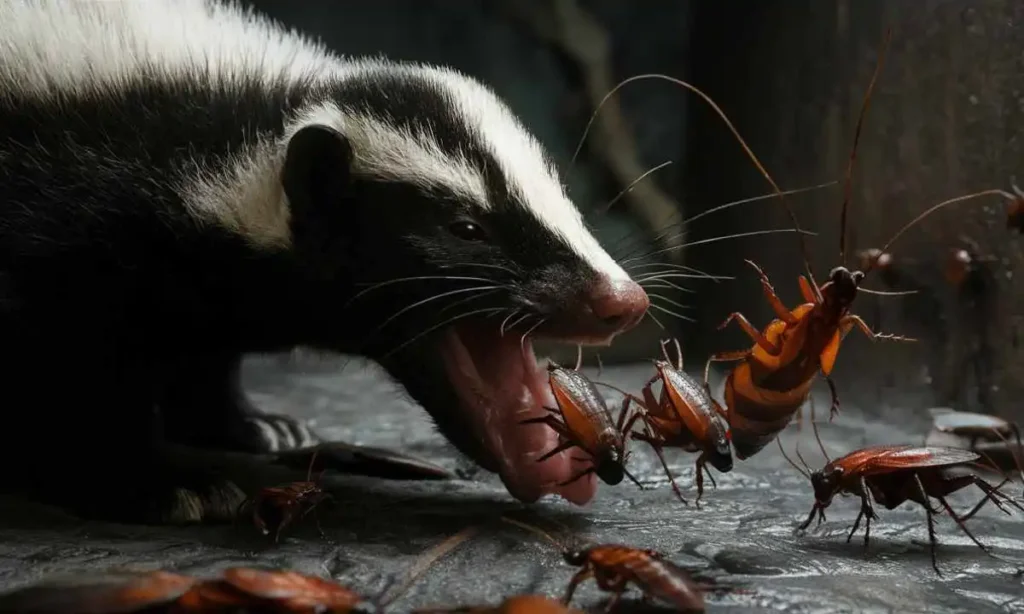
Did you know that skunks eat roaches? Yes, it’s true! This might sound like a small detail in the grand scheme of things, but it has big benefits. Skunks help control roach populations and get nutritional value from them. Let’s dive into how this works and why it’s good for both skunks and us.
Controlling Roach Population
Roaches are tough critters. They can survive in almost any environment. This makes them one of the most annoying pests around. But, skunks are on the job! By eating roaches, skunks help keep their numbers down. Here’s how they do it:
- Skunks search for food at night when roaches are most active. This makes it easier for skunks to find and eat them.
- Skunks have a great sense of smell. They can sniff out roaches hiding in dark places.
- Roaches are easy prey for skunks. They can’t run away fast enough!
Here’s a quick look at the impact:
| Without Skunks | With Skunks |
|---|---|
| More roaches | Fewer roaches |
| More pest problems | Less pest problems |
So, skunks play a big role in controlling roach populations. This keeps our homes and gardens safer and cleaner.
Nutritional Value For Skunks
Now, let’s talk about what skunks get from eating roaches. Roaches might not look tasty to us, but they are full of nutrients. Here’s what they offer skunks:
- Protein: Skunks need protein to stay strong. Roaches are a good source.
- Fats: Fats give skunks energy. Roaches have the fats skunks need.
- Minerals: Skunks also get minerals from roaches. This keeps their bones healthy.
It’s like a mini feast for skunks. Here’s a breakdown:
| Nutrient | Benefit |
|---|---|
| Protein | Builds muscle |
| Fats | Gives energy |
| Minerals | Strengthens bones |
By eating roaches, skunks stay healthy and strong. This helps them survive and thrive in the wild.
Potential Dangers
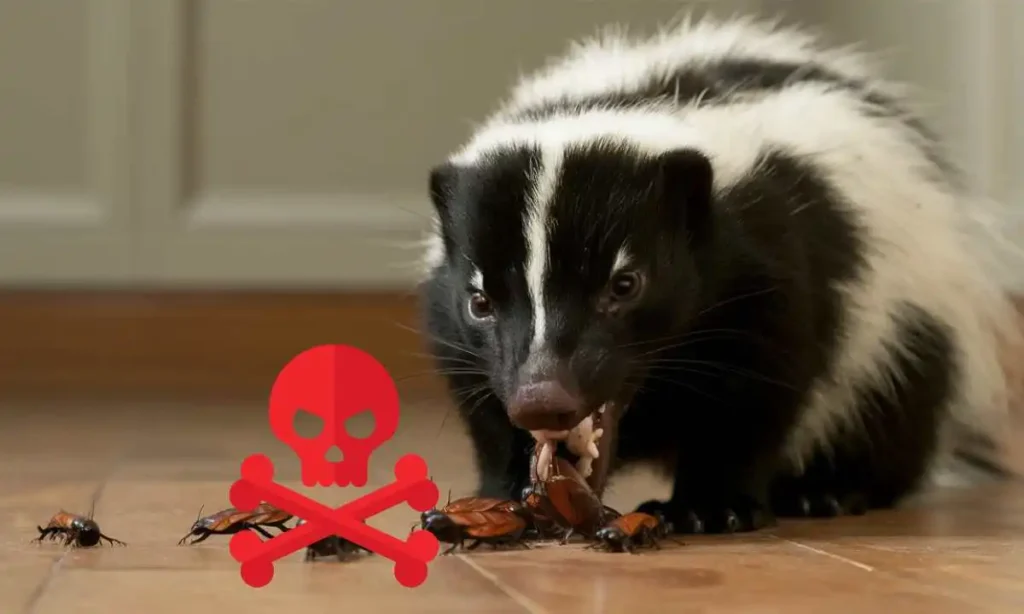
Many people wonder about the diet of skunks and if they include pests like roaches. Skunks are omnivores, which means they eat both plants and animals. Roaches can be a part of their diet, but it’s important to consider the potential dangers. Roaches might carry toxins that can harm skunks. Let’s explore the risks associated with skunks eating roaches.
Toxicity Of Roaches For Skunks
Roaches are often exposed to a variety of chemicals, making them potentially toxic meals for skunks. These insects can ingest or carry several harmful substances they pick up from their environments. For skunks, eating roaches that have been in contact with these toxins poses serious health risks. Some of the dangers include:
- Pesticides: Roaches often come into contact with insecticides, which can remain in their system. Skunks eating these poisoned roaches risk pesticide poisoning themselves.
- Bacteria: Roaches are known to carry bacteria like Salmonella and E. coli. Skunks consuming contaminated roaches might suffer from bacterial infections.
- Parasites: Roaches can be hosts to various parasites. These can transfer to skunks upon ingestion, leading to parasitic infections.
It’s essential to understand the environments roaches come from when assessing the risks they pose to skunks. Here’s a table highlighting key points:
| Roach Exposure | Risk to Skunks |
|---|---|
| Chemical-Rich Areas | High |
| Clean Environments | Low |
| Areas with Pesticide Use | High |
When skunks forage in areas with high human activity, the likelihood of consuming toxic roaches increases. It’s crucial for their health to be in cleaner, less contaminated spaces. If you live in an area with a skunk population, consider using pest control methods that are safe for wildlife to minimize these risks.
Other Food Sources For Skunks
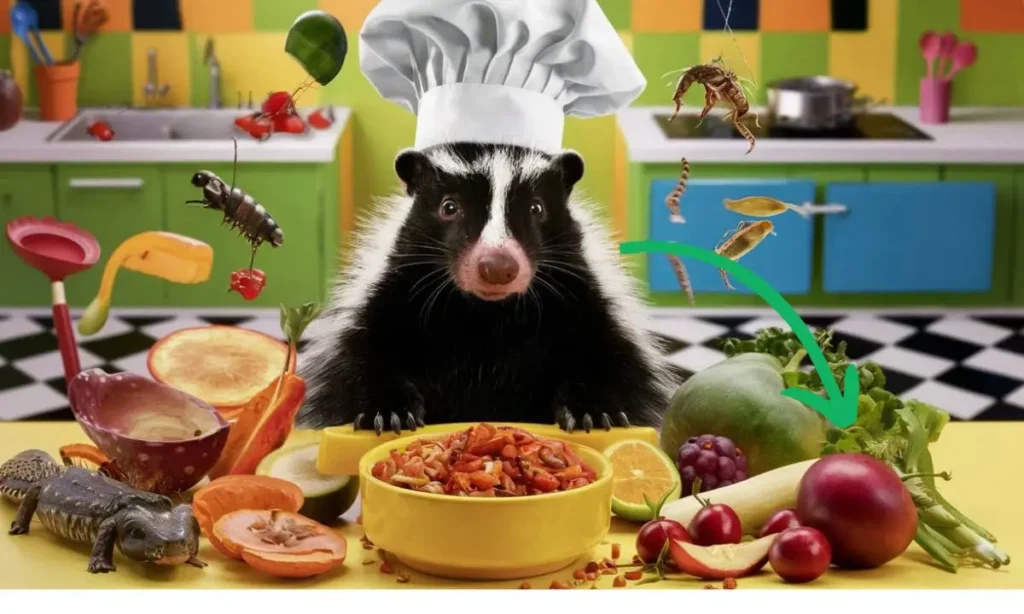
Curious minds often wonder, do skunks eat roaches? The answer is yes, skunks are not picky eaters. These black and white creatures enjoy a feast on roaches whenever they can. But their diet is diverse and includes a variety of other food sources as well. Skunks have a hearty appetite and they scour through nature’s pantry to satisfy their hunger. Let’s dive into some of the alternatives to roaches that skunks will gladly munch on.
Alternatives To Roaches
Skunks are opportunistic eaters with a diet as varied as the forest itself. Aside from roaches, they indulge in a wide range of delicacies. Their menu changes with the seasons and availability. Skunks will eat:
- Fruits: Berries, fallen apples, and other ripe fruits are sweet treats for skunks.
- Small rodents: Mice and voles provide protein-rich meals.
- Insects: Beetles, larvae, and wasps are among their favorites.
- Amphibians and reptiles: Frogs, toads, and lizards make up part of their diet.
- Plants: Leaves, roots, and grasses are eaten, especially in spring and summer.
- Eggs: Skunks often raid bird nests and turtle nests for eggs.
Skunks also have a taste for human leftovers. They are known to rummage through trash in search of food scraps. This table summarizes the variety in a skunk’s diet:
| Food Type | Examples | Season |
|---|---|---|
| Invertebrates | Roaches, beetles, wasps | Year-round |
| Small mammals | Mice, voles | Year-round |
| Fruits | Berries, apples | Summer to fall |
| Amphibians/Reptiles | Frogs, toads, lizards | Spring to fall |
| Plants | Leaves, roots | Spring to summer |
| Eggs | Bird, turtle eggs | Spring to summer |
Understanding the diet of skunks helps us appreciate their role in the ecosystem. They control pests and contribute to the balance of nature. By keeping the populations of insects and small rodents in check, skunks serve as natural pest managers. Their diverse palate reflects their adaptability and the important part they play in our environment.
Conclusion
To sum up, skunks do indeed feast on roaches as part of their varied diet. Understanding this behavior helps us appreciate the complexity of nature’s food chain. By keeping roach populations in check, skunks play a vital ecological role. So, next time you spot a skunk, remember their contribution to our ecosystem’s balance.

